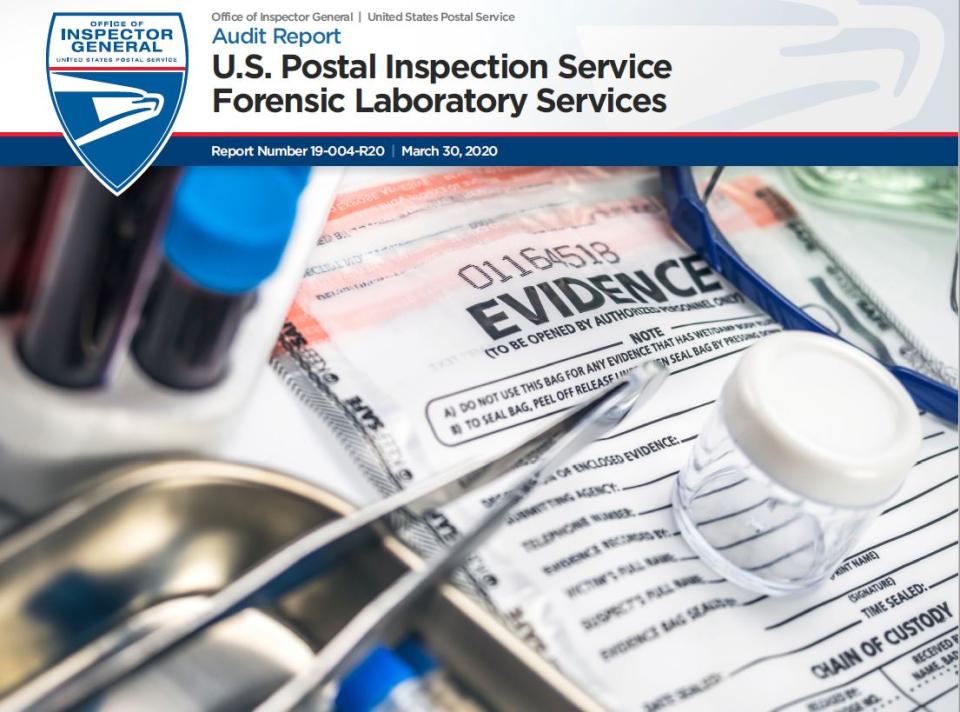U.S. Postal Inspection Service Forensic Laboratory Services
Objective
Our objective was to determine whether the Postal Inspection Service has efficient and effective controls for packaging and safeguarding evidence.
Forensic Laboratory Services (FLS) consists of the National Forensic Laboratory near Washington, D.C., and 22 digital laboratories throughout the country. FLS has been accredited since 2009 and employs forensic scientists, analysts, and contractors to assist in identifying individuals responsible for postal-related crimes. FLS comprises four units which analyze a wide variety of evidence, such as explosives, firearms, handwriting, fingerprints, controlled substances, computers, and phones.
When a postal inspector needs evidence to be analyzed, it is packaged and delivered to FLS in person or sent via Registered or Express Mail. A forensic scientist or analyst is assigned to analyze and secure the evidence while in their custody. Once the analysis is complete, a written report is provided and the evidence is packaged and returned to the inspector. The forensic scientist or analyst may later testify regarding the evidence examined.
During fiscal year (FY) 2019, FLS had 53 employees and four contractors, with an operating budget of $1,032,551. FLS analyzed 3,141 evidence submissions that contained over 125,000 pieces of evidence.
Findings
FLS has effective controls for receiving, handling, and shipping evidence. However, opportunities exist to enhance the safeguarding of evidence through improved physical security and consistent safety training. In addition, FLS did not meet evidence examination timeliness goals.
Specifically, we found that:
- FLS did not always adhere to building access control policy. We conducted site visits at the National Forensic Laboratory during October and November 2019. We observed that construction managers did not always escort their workers into the laboratory; the door to the room where visitor badges are stored was propped open, bypassing card reader access control; and a temporary visitor badge was left in an open area accessible to the public.
FLS management delegated the responsibility of distributing visitor badges, which can provide access to common areas, and escorting construction workers to the construction manager. However, that manager did not always adhere to the policy of physically escorting the workers and instead would observe them as they needed to leave the construction area. Based on our observations and the layout of the laboratory - which is not an open floor plan - we determined that the manager’s views of restricted areas can be obstructed.
Postal Service policy requires all visitors to be escorted while in controlled areas and all temporary badges be controlled. Not properly escorting visitors and leaving visitor badges unsecured could allow unauthorized access to areas where confidential evidence is being analyzed and stored.
- During FY 2019, three of 57 personnel did not complete all of the required safety training. Per the FLS Health and Safety Manual, laboratory personnel must complete safety training annually. The training records are stored in a newly developed system and unit management is required to ensure their staff complete the training. Management stated they were transitioning to the new system and overlooked the fact that the three personnel had not taken the required training. If personnel are not properly trained to safely handle hazardous evidence and respond to laboratory emergencies, they could be injured and evidence could be damaged or destroyed.
- In FY 2019, FLS did not achieve its overall laboratory and unit-specific timeliness goals for examining evidence. FLS has an overall timeliness goal of an average of 60 days to analyze evidence and produce a summary report. Each unit in the laboratory has a 30-day average timeliness goal for immediate and high priority evidence. Immediate priority evidence requires immediate attention by an analyst and is assigned for processing and examination as soon as possible. High priority evidence is processed after immediate priority evidence, but before routine evidence. Per FLS, evidence submissions not completed within 90 days are considered backlogged. FLS has not met its evidence submission timeliness goals since FY 2015; however, backlogged evidence was reduced in FY 2019.
In FY 2019:
- FLS took an average of 125 days to analyze all priority types of evidence submissions, 65 days longer than its average 60‑day timeliness goal. Further analysis determined that 1,200 of 3,141 (38 percent) evidence submissions took longer than 60 days to be examined. The Fingerprint Unit accounted for 518 (43 percent) evidence submission examinations that took longer than 60 days to complete. One fingerprint submission took 716 days to complete.
- The units within FLS took an average of 40 days to analyze evidence submissions categorized as immediate and high priority, 10 days longer than its average timeliness goal. Further analysis determined that 380 of 1,161 (33 percent) immediate and high priority evidence submission examinations were not completed within 30 days. One immediate priority evidence submission took 114 days to complete and one high priority evidence submission took 707 days to complete.
- The laboratory had 1,042 of 3,141 (33 percent) backlogged examinations of evidence submissions. Of those, 464 (45 percent) took over 365 days to complete. One evidence submission examination took 736 days.
This occurred because of staffing shortages. FLS is authorized 68 full-time employees but currently has 15 vacancies. FLS is working to hire qualified candidates and has also hired four contractors to work at the laboratory. Management stated that filling vacancies in the Washington, D.C. area is difficult because of the competitive job market. FLS updates its fiscal year objectives document annually to include timeliness and backlog reduction targets. However, these documents did not contain plans to address staffing shortages. A plan should be specific, measurable, relevant, and timely. Not analyzing evidence timely could negatively impact criminal investigations and court proceedings.
Recommendations
We recommended management:
- Ensure all visitor badges at the National Forensic Laboratory are secured and reinforce the Postal Service’s physical security control policy by providing periodic briefings to all staff.
- Direct the FLS safety officer to verify all personnel complete required annual safety training.
- Create a plan to address staffing shortages.

